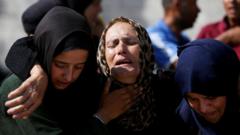Despite achieving military success, Israel's global reputation has taken a hit, raising concerns over its future relationships.
The Cost of Victory: Israel's Strength Comes with Isolation

The Cost of Victory: Israel's Strength Comes with Isolation
Israel is experiencing heightened security but at a significant diplomatic cost as a response to recent conflicts.
After decades of conflict in the region, Israel has emerged more secure than at any time since its establishment in 1948. The country has significantly weakened its primary adversaries, including Hezbollah, Hamas, and various militant groups in Yemen, achieving what appears to be an unprecedented military dominance in the Middle East. This newfound strength comes with the notable decline of nuclear threats from Iran and the development of ties with some Persian Gulf states. Israeli Prime Minister Benjamin Netanyahu's partnership with President Trump has further solidified Israel's position.
Retired General Yaakov Amidror speaks to a transformed security landscape, asserting that areas once threatened by conflict will now find themselves as secure as major American cities. However, this military triumph has not come without consequences. Numerous global commentators have labeled Israel's aggressive military response to the October 7, 2023, attack by Hamas as disproportionate, resulting in accusations of war crimes and a growing perception of the country as a pariah on the world stage.
The severe humanitarian situation in Gaza reflects the price of the conflict, with tens of thousands reported dead, and over a million left homeless amid widespread devastation. The psychological toll on Israeli society is palpable as well, with many families grappling with the deaths of soldiers and the uncertainty surrounding hostages still believed to be held in Hamas territories. As sentiments against Israel grow, the nation faces a daunting question: can it maintain security while rebuilding its international standing?



















